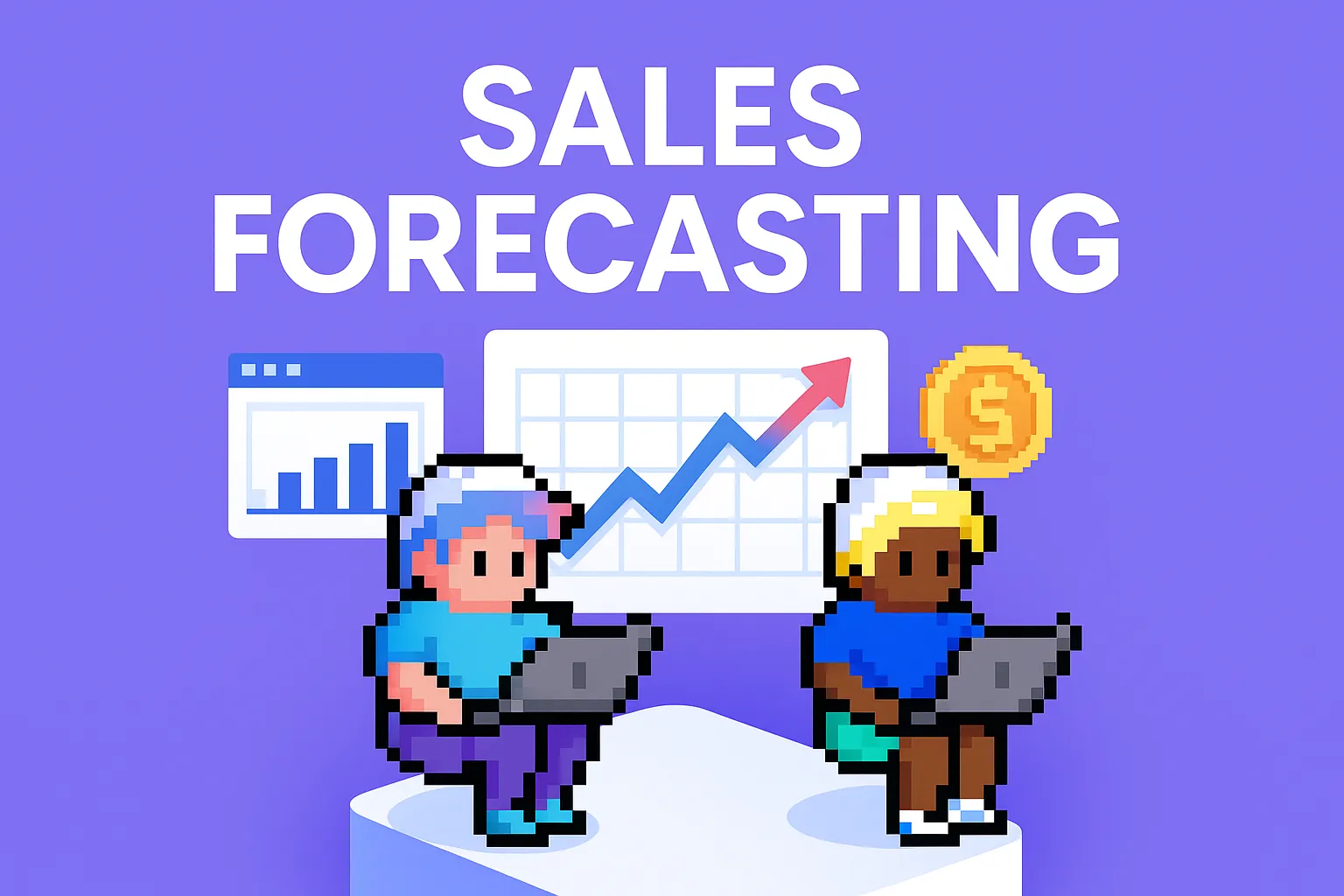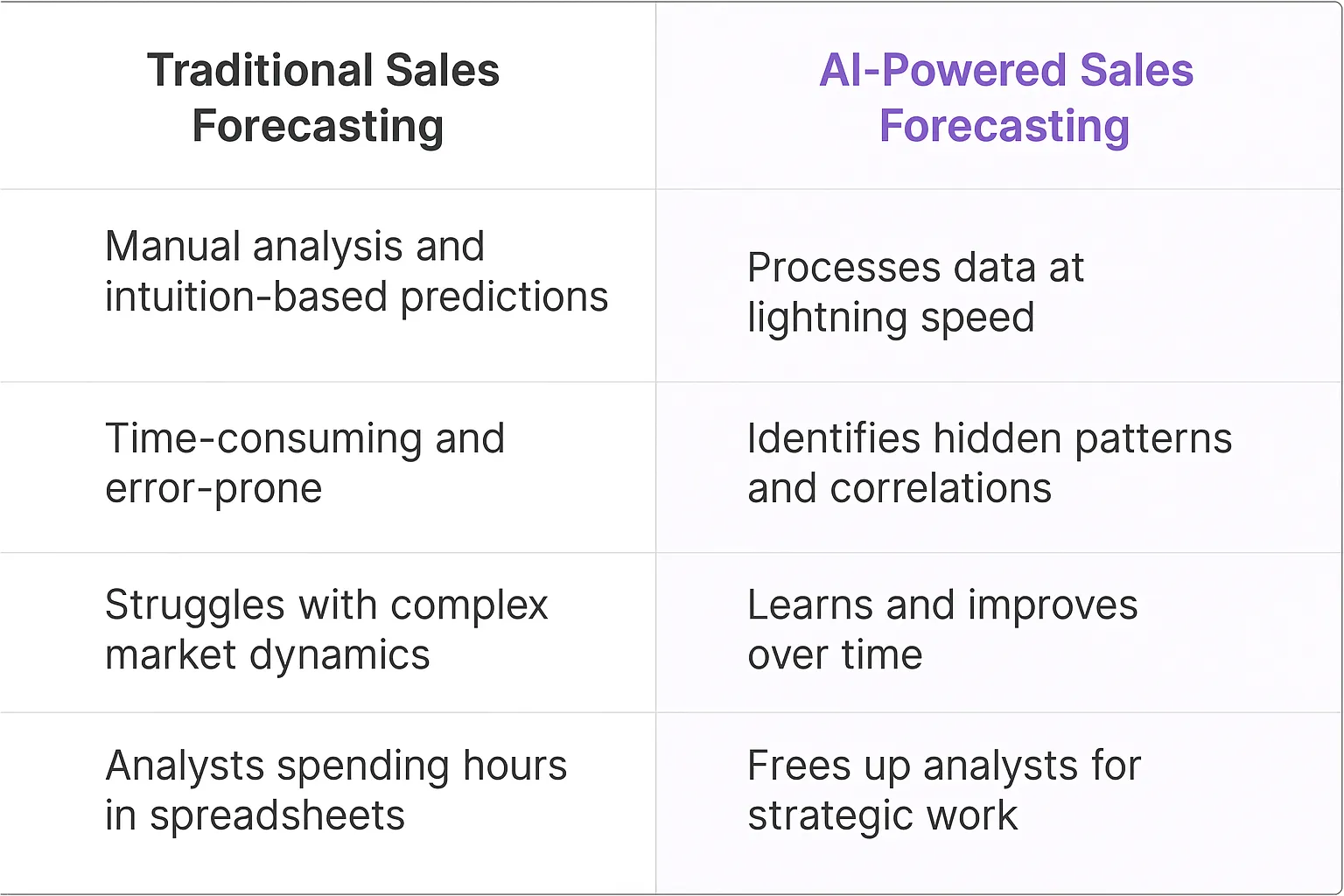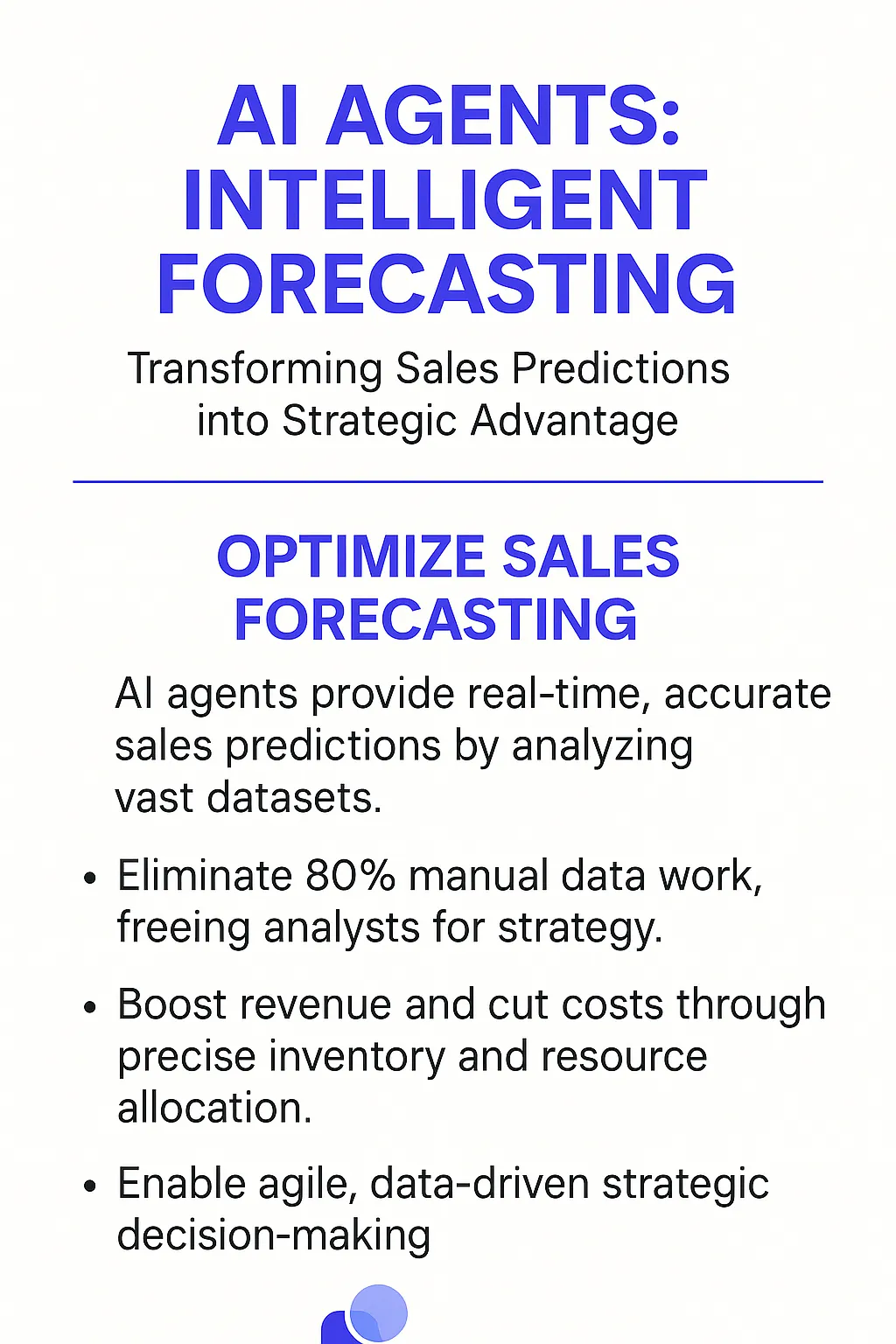A Sales Forecasting Analyst is a crucial role in any sales-driven organization. These professionals are responsible for predicting future sales trends, helping companies make informed decisions about inventory, staffing, and overall strategy. Traditionally, they've relied on historical data, market research, and intuition to create forecasts. However, the landscape is rapidly changing with the introduction of AI agents.
The integration of AI agents has supercharged the capabilities of Sales Forecasting Analysts. These digital teammates bring several game-changing features to the table:1. Data Processing at Scale: AI agents can crunch vast amounts of data from diverse sources, far beyond what a human analyst could handle.2. Pattern Recognition: They excel at identifying subtle trends and correlations that might escape human notice.3. Real-time Adaptability: AI models continuously learn and adjust their predictions based on new data, ensuring forecasts remain current.4. Scenario Analysis: These tools can rapidly generate and evaluate multiple future scenarios, providing a comprehensive view of possible outcomes.5. Automated Reporting: AI agents can create detailed, visually appealing reports and dashboards, saving analysts hours of manual work.With these features, Sales Forecasting Analysts are evolving from number crunchers to strategic advisors, leveraging AI insights to drive business decisions.

Before AI agents entered the scene, sales forecasting analysts were stuck in spreadsheet hell. They'd spend countless hours manually crunching numbers, poring over historical data, and making educated guesses about future sales trends. It was a time-consuming process prone to human error and bias. Analysts relied heavily on their intuition and experience, which, while valuable, often fell short when dealing with complex market dynamics and large datasets.
Traditional forecasting methods like time series analysis and regression models were the go-to tools. But these approaches struggled to capture the nuanced interplay of factors affecting sales performance. The result? Forecasts that were often off the mark, leading to misaligned inventory, inefficient resource allocation, and missed opportunities.
Enter AI agents – the game-changers in sales forecasting. These digital teammates are transforming the landscape, offering a potent mix of speed, accuracy, and adaptability that human analysts could only dream of.
First off, AI agents can process vast amounts of data at lightning speed. They're not just looking at historical sales figures; they're ingesting market trends, social media sentiment, economic indicators, and even weather patterns. This holistic approach allows for more nuanced and accurate predictions.
But here's where it gets really interesting: AI agents learn and improve over time. They're constantly refining their models based on new data and outcomes. This means their forecasts become increasingly accurate, adapting to changing market conditions in real-time.
Another killer feature? AI agents can identify patterns and correlations that humans might miss. They're uncovering hidden insights that can drive strategic decision-making. For example, an AI agent might spot a subtle relationship between a specific marketing campaign and sales spikes in certain regions, informing future marketing strategies.
Perhaps most importantly, AI agents free up human analysts to focus on high-value tasks. Instead of getting bogged down in data cleaning and basic number crunching, analysts can now spend their time interpreting AI-generated insights, crafting strategies, and making informed decisions. It's a perfect symbiosis of human creativity and machine precision.
The bottom line? AI agents are not just improving sales forecasts; they're fundamentally changing how businesses approach predictive analytics. They're enabling a level of agility and responsiveness that was previously unthinkable. In the high-stakes world of sales, where accurate forecasts can make or break a quarter, AI agents are quickly becoming indispensable allies for Business Intelligence Analysts.

Sales forecasting is a critical process that can make or break a company's strategic decisions. AI agents are poised to transform this field, offering capabilities that go beyond traditional methods. These digital teammates can sift through vast amounts of data, identify patterns invisible to the human eye, and generate insights that drive more accurate predictions.
One key process where AI shines is in data integration. Sales forecasting analysts often grapple with disparate data sources - CRM systems, market trends, economic indicators, and historical sales data. An AI agent can seamlessly pull this information together, creating a unified dataset that forms the foundation for robust forecasting models.
Another critical process is trend analysis. AI agents excel at detecting subtle shifts in buying patterns or market conditions that might escape human notice. They can continuously monitor and analyze these trends, providing real-time updates to forecasting models and ensuring predictions stay current in a rapidly changing business landscape.
When it comes to specific tasks, AI agents are game-changers for sales forecasting analysts. Take data cleaning and preprocessing, for instance. This tedious yet crucial task often consumes a significant portion of an analyst's time. An AI agent can handle this task with speed and precision, freeing up the analyst to focus on higher-level strategic thinking.
Model selection and optimization is another area where AI agents shine. They can rapidly test multiple forecasting models against historical data, fine-tune parameters, and select the most accurate approach for each specific scenario. This level of sophistication in model selection was previously only achievable with significant time investment from highly skilled data scientists.
Scenario analysis becomes more powerful with AI agents. They can generate and evaluate thousands of potential future scenarios, providing a comprehensive view of possible outcomes. This allows sales forecasting analysts to prepare for a wide range of contingencies and make more informed decisions.
Lastly, AI agents excel at generating detailed, data-driven reports. They can create visually appealing dashboards and reports that clearly communicate forecasts and underlying insights to stakeholders across the organization. This task alone can save hours of work for analysts who previously had to manually compile and format this information.
The integration of AI agents into sales forecasting isn't just an incremental improvement - it's a fundamental shift in how we approach predictive analytics. As these digital teammates become more sophisticated, they'll enable sales forecasting analysts to operate at a higher level, focusing on strategy and interpretation rather than getting bogged down in data wrangling and number crunching.
The companies that successfully leverage AI in their sales forecasting processes will gain a significant competitive edge. They'll be able to make more accurate predictions, respond more quickly to market changes, and ultimately make better strategic decisions. The future of sales forecasting is here, and it's powered by AI.

AI agents are reshaping the landscape of sales forecasting analysis across diverse sectors. Their ability to crunch massive datasets, identify subtle patterns, and adapt to market shifts makes them indispensable digital teammates for modern businesses. Let's dive into some industry-specific scenarios where these AI-powered tools are making waves:
In retail, AI agents are becoming the secret weapon for predicting seasonal trends and optimizing inventory. They're not just number crunchers; they're the cool heads in the room during holiday rushes and flash sales. These digital teammates are parsing through years of sales data, social media chatter, and even weather patterns to give retailers a crystal ball for demand forecasting.
Over in the tech sector, AI agents are the unsung heroes behind product launch strategies. They're analyzing user adoption rates, feature popularity, and competitor moves to help companies nail their release timelines and feature prioritization. It's like having a psychic on your product team, but one that operates on data, not crystal balls.
The pharmaceutical industry is leveraging these AI agents to forecast drug demand and navigate the complex waters of clinical trials. These digital teammates are processing vast amounts of patient data, regulatory changes, and global health trends to help pharma companies stay ahead of the curve. It's not just about predicting sales; it's about anticipating healthcare needs on a global scale.
Each of these use cases demonstrates how AI agents are becoming integral to sales forecasting across industries, offering insights that were once the domain of seasoned analysts with decades of experience. They're not replacing human expertise; they're amplifying it, allowing businesses to make decisions with unprecedented speed and accuracy through predictive analytics.
The retail industry is ripe for disruption, and AI-powered sales forecasting is the secret weapon that's about to change the game. Let's dive into how a Sales Forecasting Analyst AI Agent could transform the way retailers operate and compete in the market.
Think about the typical retail forecasting process. It's often a mix of gut feelings, historical data, and Excel spreadsheets. But what if we could take that process and inject it with the power of machine learning and real-time data analysis?
Enter the Sales Forecasting Analyst AI Agent. This digital teammate doesn't just crunch numbers; it devours data from multiple sources - social media trends, weather patterns, economic indicators, and even competitor pricing. It's like having a team of data scientists working 24/7 to predict your sales with uncanny accuracy.
Here's where it gets interesting: This AI agent doesn't just tell you what might sell next month. It breaks down predictions by store location, product category, and even specific SKUs. It can spot emerging trends before they hit the mainstream, allowing retailers to stock up on the next hot item before their competitors even know it exists.
But the real magic happens when this AI agent starts to influence decision-making across the entire retail operation. Suddenly, your supply chain team knows exactly when to reorder products to meet demand without overstocking. Your Marketing Operations Manager can time promotions to coincide with predicted lulls in sales. Your HR department can optimize staffing based on forecasted busy periods.
The result? A retail operation that's not just reactive, but proactive. One that's always one step ahead of consumer demand, market trends, and competitive pressures. It's the difference between playing catch-up and setting the pace in the retail race.
This isn't just about improving accuracy by a few percentage points. We're talking about a fundamental shift in how retail businesses operate. It's the kind of change that separates the next generation of retail giants from the companies that will be left wondering what hit them.
The retailers who embrace this technology won't just survive; they'll thrive in an increasingly competitive landscape. They'll be the ones writing the playbook for 21st-century retail success, powered by AI that's always learning, always adapting, and always pushing the boundaries of what's possible in sales forecasting.
The real estate market is notoriously cyclical and hard to predict. But what if we could change that? Enter the Sales Forecasting Analyst AI Agent for real estate. This isn't your grandfather's property market analysis - it's a game-changer that's about to flip the industry on its head.
Let's break it down. Traditional real estate forecasting relies heavily on historical data, local market knowledge, and a hefty dose of gut feeling. It's slow, often inaccurate, and struggles to account for rapid market shifts. The AI Agent approach? It's like giving a supercomputer crystal ball to every real estate professional.
This digital teammate ingests and analyzes vast amounts of data: property listings, sales histories, economic indicators, demographic trends, urban development plans, and even social media sentiment. But here's where it gets interesting - it doesn't just process this data, it understands it. It spots patterns and correlations that human analysts might miss, and it does it in real-time.
The implications are massive. Imagine a real estate firm that can predict with uncanny accuracy which neighborhoods will see a surge in demand six months from now. Or a developer who knows exactly when to break ground on a new project to maximize returns. This isn't just incremental improvement - it's a fundamental reshaping of how the real estate game is played.
But the real power comes from how this AI agent can influence decision-making across the entire real estate ecosystem. Suddenly, investment strategies become more targeted and less risky. Marketing efforts can be precisely timed to coincide with predicted upswings in buyer interest. Even urban planning could be influenced by these AI-driven insights, leading to smarter, more responsive city development.
The winners in this new paradigm won't just be the big players with deep pockets. This technology has the potential to level the playing field, giving smaller agencies and independent realtors access to insights that were previously the domain of large corporations with extensive research departments.
We're talking about a shift from reactive to proactive real estate strategies. It's not just about responding to market trends - it's about anticipating and shaping them. The firms that embrace this technology won't just be participating in the market; they'll be defining it.
This is the kind of disruption that separates the next generation of real estate moguls from those who'll be left wondering what hit them. It's not just a new tool - it's a new way of thinking about property markets, one that's always learning, always adapting, and always pushing the boundaries of what's possible in real estate forecasting.
The real estate professionals who lean into this AI-driven approach won't just survive the next market shift - they'll thrive in it, setting new standards for success in an industry ripe for transformation. Welcome to the future of real estate, where AI doesn't just predict the market - it shapes it. Market Research Analysts in this space are already seeing the benefits of these advanced forecasting capabilities.
Implementing a Sales Forecasting Analyst AI Agent isn't just about plugging in some fancy algorithms and calling it a day. It's a complex beast that requires serious technical chops and a deep understanding of both sales dynamics and machine learning.
First off, data quality is a massive hurdle. Sales data is often messy, inconsistent, and spread across multiple systems. You're dealing with CRMs, ERPs, spreadsheets, and probably some guy's notebook from 2015. Cleaning and integrating this data is a Herculean task that can make or break your AI agent's effectiveness.
Then there's the challenge of feature engineering. Sales forecasting isn't just about historical sales data. You need to factor in economic indicators, competitor actions, marketing campaigns, and even social media sentiment. Creating meaningful features from this diverse data set is both an art and a science.
Model selection and tuning is another technical minefield. Do you go with traditional time series models like ARIMA, or dive into the deep end with neural networks? Each approach has its pros and cons, and finding the right balance between accuracy and interpretability is crucial. Model selection becomes a critical decision point that can determine the success of your entire forecasting system.
On the operational side, integrating an AI Sales Forecasting Analyst into existing workflows is like trying to teach a cat to bark - it's not impossible, but it's going to take some serious effort and probably a few scratches along the way.
First, there's the human factor. Sales teams are often set in their ways, relying on gut feelings and personal relationships. Convincing them to trust an AI's predictions over their instincts is a tough sell. You need to build trust gradually, showing how the AI can augment their skills rather than replace them.
Then there's the challenge of real-time updates. Markets change fast, and your AI needs to keep up. This means setting up robust data pipelines that can ingest and process new information quickly, without bringing your entire system to a grinding halt.
Explainability is another operational headache. When the AI predicts a 30% drop in sales next quarter, your C-suite is going to want to know why. Building in interpretability features that can break down predictions into understandable factors is crucial for adoption and decision-making.
Finally, there's the ever-present issue of scalability. As your business grows and expands into new markets or product lines, can your AI agent keep up? Designing a system that can scale horizontally and adapt to new data sources and market conditions is a challenge that requires constant attention and iteration.
Implementing a Sales Forecasting Analyst AI Agent is a journey, not a destination. It requires a mix of technical prowess, change management skills, and a healthy dose of patience. But get it right, and you'll have a digital teammate that can provide insights and predictions that even the most seasoned sales veteran would envy.
The marriage of AI agents and Sales Forecasting Analysts is more than just a technological upgrade - it's a paradigm shift in how businesses approach predictive analytics. These digital teammates are enabling a level of accuracy, speed, and adaptability that was previously unthinkable in sales forecasting.As we've seen, the benefits span across industries, from retail to real estate, offering game-changing insights and competitive advantages. However, the journey isn't without its challenges. Technical hurdles like data quality and model selection, coupled with operational challenges such as change management and scalability, require careful navigation.Despite these obstacles, the potential rewards are too significant to ignore. Companies that successfully integrate AI agents into their sales forecasting processes will be better positioned to anticipate market shifts, optimize operations, and ultimately drive growth.The future of sales forecasting is here, and it's powered by AI. As these digital teammates continue to evolve, they'll not just predict the future of sales - they'll help shape it. For Sales Forecasting Analysts and the businesses they serve, embracing this AI-driven future isn't just an option - it's a necessity for staying competitive in an increasingly data-driven world.